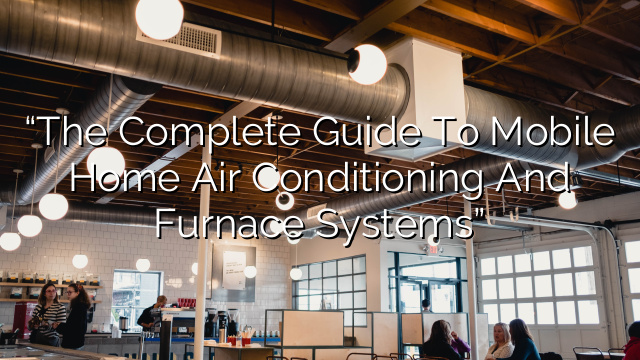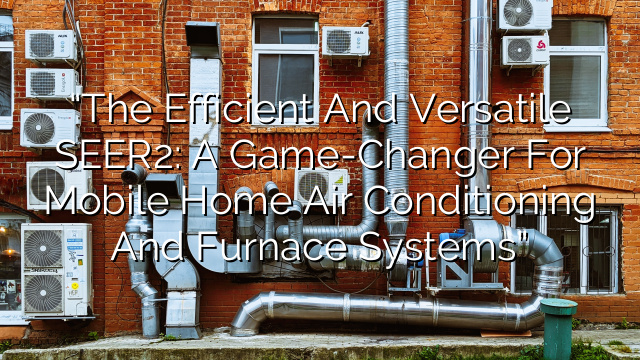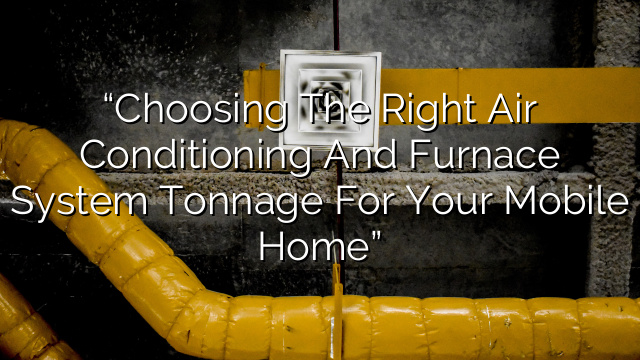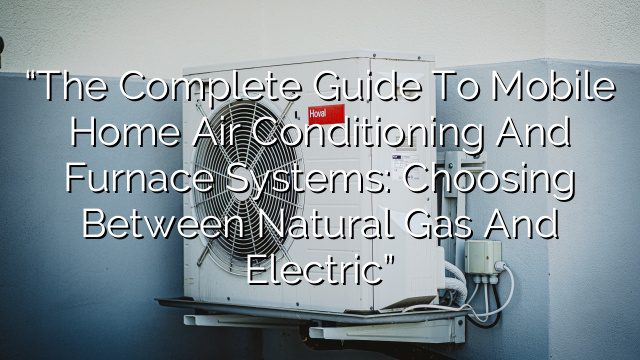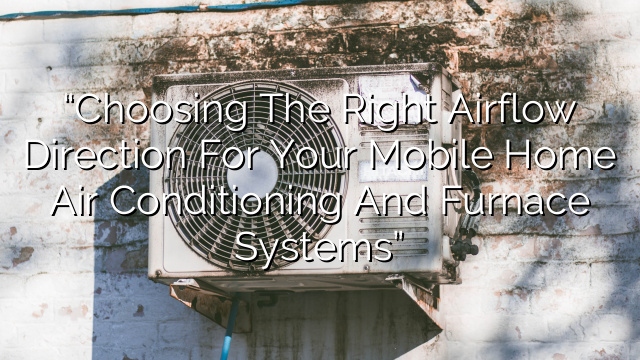Introduction
When it comes to mobile homes, having a reliable air conditioning and furnace system is essential. These systems ensure that your home stays comfortable, regardless of the outside temperature. In this complete guide, we will discuss everything you need to know about mobile home air conditioning and furnace systems, including furnace efficiency and different AFUE options.
Mobile Home Air Conditioning Systems
Mobile homes typically require specialized air conditioning systems that are designed to fit the unique constraints of these structures. When choosing an air conditioning system for your mobile home, there are a few factors to consider:
- Size: Mobile homes are smaller than traditional homes, so you’ll need an air conditioning system that is appropriately sized. Too small of a unit won’t sufficiently cool your home, while too large of a unit may cycle on and off too frequently, leading to energy inefficiency and wear and tear on the system.
- Type: There are several types of air conditioning systems available for mobile homes, including packaged units and split systems. Packaged units house all the components of the system in a single cabinet and are typically installed outside the home. Split systems, on the other hand, have the condenser unit located outside and the evaporator coil and air handler located inside the home.
- Efficiency: Air conditioning systems are rated for energy efficiency using a measure called SEER (Seasonal Energy Efficiency Ratio). The higher the SEER rating, the more efficient the system. For mobile homes, it’s generally recommended to choose an air conditioning system with a SEER rating of at least 14.
Mobile Home Furnace Systems
Just like air conditioning systems, mobile home furnace systems are designed to meet the specific needs of these structures. A good furnace system should provide reliable heating during the colder months while also being energy efficient. Here are some important considerations:
- Type: Mobile homes typically use either gas furnaces or electric furnaces. Gas furnaces are more common and use natural gas or propane as a fuel source. Electric furnaces, on the other hand, rely on electricity.
- Efficiency: Furnace efficiency is rated using an AFUE (Annual Fuel Utilization Efficiency) percentage. This percentage represents the amount of fuel that is converted to usable heat. For mobile homes, furnace efficiency options typically range from 80% to 96%. A higher AFUE rating means a more efficient furnace, but also a higher upfront cost.
- Size: Just like with air conditioning systems, it’s important to choose a furnace that is appropriately sized for your mobile home. A furnace that is too small won’t provide sufficient heat, while one that is too large may cycle on and off too frequently.
Furnace Efficiency / AFUE: 80%, 95%, 96%
AFUE is an important measure when it comes to furnace efficiency. It represents the percentage of fuel that is converted into usable heat. Here are the common efficiency options available for mobile home furnaces:
- 80% AFUE: An 80% AFUE furnace is a reliable and cost-effective option. It converts 80% of the fuel it uses into heat, while the remaining 20% is lost through exhaust gases.
- 95% AFUE: A furnace with a 95% AFUE rating is more efficient than an 80% AFUE model. It converts 95% of the fuel into usable heat, resulting in lower energy bills. However, these units are generally more expensive upfront.
- 96% AFUE: A furnace with a 96% AFUE rating is among the most efficient options available. It converts a significant amount of fuel into heat, resulting in even lower energy bills. However, the upfront cost is typically higher than for 80% or 95% AFUE models.
In this complete guide, we have covered the key aspects of mobile home air conditioning and furnace systems. From choosing the right size and type of system to considering efficiency options, it’s crucial to make informed decisions when it comes to these essential components of your mobile home. By doing so, you can ensure comfort and energy efficiency all year round.
Frequently Asked Questions (FAQ)
- What is the lifespan of a mobile home air conditioning system and furnace? The lifespan of an air conditioning system or furnace can vary depending on factors such as maintenance, usage, and quality of the unit. On average, a well-maintained air conditioning system can last 10-15 years, while a furnace can last 15-20 years.
- How often should I replace my air filters? It’s recommended to replace air filters every 1-3 months, depending on factors such as the number of occupants, pets, and allergies. Regularly replacing air filters helps maintain optimal system performance and indoor air quality.
- Can I install a traditional air conditioning system or furnace in my mobile home? Mobile homes have unique requirements, so it’s best to choose systems specifically designed for these structures. Traditional systems may not fit properly or meet the necessary safety standards for mobile homes.
- Should I hire a professional for installation and maintenance? It’s highly recommended to hire a professional HVAC technician for the installation and maintenance of your mobile home air conditioning and furnace systems. They have the expertise and experience to ensure proper installation, optimal performance, and regular maintenance to extend their lifespan.
- How can I improve the energy efficiency of my mobile home HVAC system? There are several ways to improve the energy efficiency of your HVAC system. Regular maintenance, such as cleaning and replacing air filters, can optimize performance. Additionally, proper insulation and sealing of ductwork and windows can minimize energy loss.

